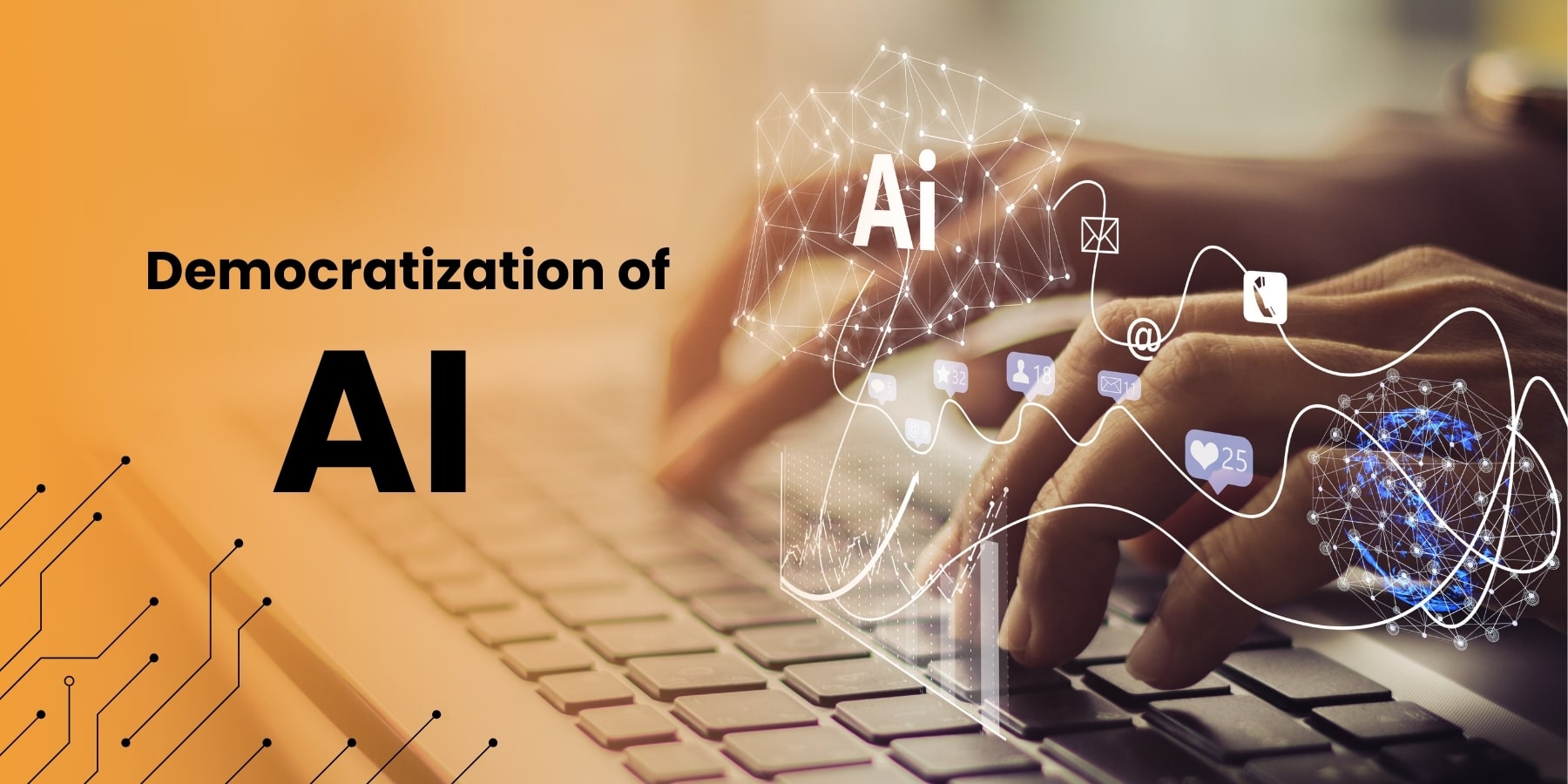Making AI Tools Accessible: The Democratization of Technology
There is a lot of talk about democratizing artificial intelligence (AI) these days. But AI is actually a key part of innovation in many fields. This idea has become a symbol of freedom and openness. As an author who is very interested in how technology can help society, I’ve been fascinated by the transformative potential that the widespread use of AI has.
This exploration delves into what it means to democratize AI, thereby presenting its challenges and opportunities. It also considers the impact it could have on making technology accessible to all, irrespective of their technical background or resources.
Table of Contents
Unveiling the Concept: What is the Democratization of AI?
The Drive Towards Democratization
Challenges in the Path of Democratization
Overcoming Obstacles: Towards an Inclusive AI
Democratization in Action: Examples of Success
The Future Landscape: AI for All
Building a Community Around AI
Unveiling the Concept: What is the Democratization of AI?
The democratization of artificial intelligence refers to making AI tools, data, and capabilities accessible to people across different sectors. Thus, their backgrounds and skill levels. It’s about breaking down the barriers that make AI seem like an exclusive club for the tech-savvy or the well-resourced.
By democratizing AI, we aim to enable a wider range of individuals and organizations to develop and use it. Also, benefit from AI technologies without needing deep expertise in data science or computer programming.
- Accessibility: Ensuring AI tools are user-friendly and accessible to non-specialists.
- Empowerment: Empowering individuals and organizations to leverage AI for innovation and problem-solving.
- Collaboration: Encouraging collaboration across disciplines to drive diverse and inclusive AI solutions.
The Drive Towards Democratization
The realization that the potential of AI shouldn’t be reserved for tech giants and specialized researchers is what is driving the movement towards democratizing AI. Instead, it should be a resource that everyone can tap into. Hence, fostering innovation, addressing societal challenges, and driving growth across all sectors.
- Bridging the Skill Gap: Simplifying AI tools to make them accessible to a broader audience.
- Fostering Innovation: Enabling diverse perspectives in AI development to encourage innovation.
- Promoting Equity: Reducing the digital divide and ensuring equitable access to AI technologies.
Challenges in the Path of Democratization
Despite its promising prospects, the journey towards AI democratization is fraught with challenges. These range from technical hurdles to ethical considerations, each requiring thoughtful navigation.
- Data Privacy and Security: Ensuring the democratization of AI does not compromise data privacy and security.
- Quality and Reliability: Maintaining the quality and reliability of AI outputs as the technology becomes more accessible.
- Ethical Use: Addressing ethical concerns related to AI use, including biases and decision-making transparency.
Overcoming Obstacles: Towards an Inclusive AI
The path to democratizing AI involves overcoming these challenges through concerted efforts from governments, industries, and the academic community. This includes developing frameworks for ethical AI use. Thus, investing in education and training, and creating platforms that make AI tools more user-friendly and accessible.
- Ethical Frameworks: Establishing guidelines for the responsible use of AI.
- Education and Training: Providing resources and training to help non-experts engage with AI.
- User-Friendly Platforms: Developing platforms that abstract the complexities of AI technologies.
Democratization in Action: Examples of Success
Several initiatives and platforms exemplify the successful democratization of AI, showing what is possible when technology is made accessible.
- Open-Source Libraries: Libraries like TensorFlow and PyTorch offer powerful AI tools that are accessible to a broader audience.
- Cloud-Based AI Services: Platforms like AWS, Google Cloud, and Microsoft Azure provide AI services that businesses of all sizes can leverage.
- Educational Programs: Universities and online platforms offer courses that aim to make AI knowledge accessible to everyone.
The Future Landscape: AI for All
Looking ahead, the democratization of AI promises a future where technology empowers every sector, enhancing creativity, innovation, and problem-solving capabilities across the board. This future is not just about AI development; it’s about creating a society that harnesses the power of AI for collective progress.
- Widespread AI Adoption: Seeing AI being used innovatively in sectors beyond tech, including healthcare, education, and the arts.
- Ethical and Responsible AI Use: A continued focus on ensuring AI is used ethically, responsibly, and transparently.
Navigating the Road Ahead
The journey towards the democratization of AI is complex and ongoing. It requires the dedication of stakeholders across various sectors to address challenges, seize opportunities, and work towards a future where AI tools and capabilities are within reach of everyone. As we navigate this road, it’s crucial to maintain a dialogue on how to best achieve this vision. Hence, ensuring that the benefits of AI-enabled data democratization are shared broadly and equitably.
- Stakeholder Engagement: Encouraging dialogue among all AI development and use stakeholders.
- Continuous Learning and Adaptation: Embracing a mindset of constant learning to adapt to the evolving AI landscape.
- Policy and Regulation: Developing policies and regulations that support the ethical and equitable use of AI, ensuring that as AI technologies advance, they do so in a way that benefits society.
The democratization of AI is not just a technological challenge; it’s a societal imperative. By making AI accessible, we open up endless possibilities for innovation, problem-solving, and advancement in virtually every field imaginable. From tackling climate change with predictive modeling to revolutionizing healthcare through personalized medicine, the potential applications of AI are as diverse as they are impactful.
Building a Community Around AI
Building a community of AI users, students, and supporters who are willing to share information, tools, and the best ways to do things is an important part of making AI more accessible to everyone. This community should be inclusive, welcoming individuals from all backgrounds and disciplines, recognizing that the future of AI depends on our collective efforts.
- Mentorship and Support: Creating mentorship opportunities for those new to AI, providing guidance and support as they navigate this complex field.
- Open Forums for Discussion: Facilitating open forums where individuals can share ideas, challenges, and successes related to AI.
- Cross-Disciplinary Collaboration: Encouraging collaboration between technologists, ethicists, business leaders, and policymakers to ensure AI develops in a balanced and beneficial manner.
Ensuring Equity in AI Access
As we strive to democratizing artificial intelligence, we must also ensure that access to AI technologies is equitable. This means addressing the digital divide and ensuring that individuals and communities worldwide have the resources and infrastructure necessary to engage with AI.
- Global Connectivity: Working towards global internet connectivity and digital literacy, ensuring that AI tools and resources are accessible to all.
- Localized Solutions: Developing AI solutions that address local challenges and needs, ensuring that the benefits of AI are not confined to tech-savvy regions or industries.
- Affordable Access: Making AI tools and training affordable, removing financial barriers to entry and enabling a wider range of individuals and organizations to explore the potential of AI.
Embracing Ethical AI Development
Ethics must be at the core of AI democratization efforts. As AI permeates more aspects of our daily lives, developing and implementing these technologies responsibly is crucial. This includes addressing AI algorithm biases, ensuring AI decision-making transparency, and prioritizing human well-being in all AI initiatives.
- Bias Mitigation: Implementing robust processes to identify and mitigate biases in AI datasets and algorithms.
- Transparency and Explainability: Ensuring AI systems are transparent and their decisions can be explained, fostering trust and understanding among users.
- Prioritizing Human Well-being: Ensuring that AI developments prioritize human well-being, incorporating ethical considerations from the outset.
Key Takeaways and Actionable Insights
As we wrap up our journey through the theme of democratizing artificial intelligence technology, it’s clear that making AI tools accessible plays a crucial role in fostering innovation and inclusivity across various sectors. Here are three pivotal takeaways:
- Widen Access: Broadening access to AI tools and technologies is essential for encouraging innovation and participation from a diverse range of individuals and organizations.
- Empower Through Education: Providing education and resources on AI enables a broader audience to engage with and utilize these powerful tools, breaking down barriers to entry.
- Ethical Considerations: As AI becomes more accessible, it’s imperative to address ethical concerns, ensuring that the technology is used responsibly and benefits society as a whole.
We’ve delved into the significance of making AI tools available to all, highlighting the impact on innovation, ethical usage, and breaking down traditional barriers.
We’re eager to hear your views on AI democratization and how it’s influencing your sector or work. Share your insights in the comments or join the conversation on our social media pages: Facebook, Instagram, and Linkedin.

Nandhini A
Nandhini A, with over 15 years of experience, currently serves as a Relationship Manager at Recruit Ninjas. Her expertise includes driving business process success, leading operations, and team development. She excels in optimizing efficiency and productivity, driving sales, and fostering high levels of customer satisfaction and retention.






